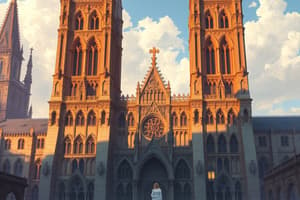Podcast
Questions and Answers
Which architectural style is characterized by the extensive use of sculptures conveying cultural and religious messages?
Which architectural style is characterized by the extensive use of sculptures conveying cultural and religious messages?
- Renaissance architecture
- Baroque architecture
- Gothic architecture
- Romanesque architecture (correct)
What is the main difference between Romanesque and Gothic architecture in terms of arches?
What is the main difference between Romanesque and Gothic architecture in terms of arches?
- Both Romanesque and Gothic used round arches
- Romanesque used pointed arches while Gothic used round arches
- Romanesque used round arches while Gothic used pointed arches (correct)
- Both Romanesque and Gothic used pointed arches
Which architectural style is known for its characteristic of verticality due to the use of pointed arches?
Which architectural style is known for its characteristic of verticality due to the use of pointed arches?
- Neoclassical architecture
- Renaissance architecture
- Gothic architecture (correct)
- Romanesque architecture
What feature is common in Romanesque, Gothic, and Renaissance architecture?
What feature is common in Romanesque, Gothic, and Renaissance architecture?
Which architectural style introduced the use of transepts to the Roman basilica plan?
Which architectural style introduced the use of transepts to the Roman basilica plan?
In terms of structural strength, what advantage did using thick walls made of stone provide in Romanesque architecture?
In terms of structural strength, what advantage did using thick walls made of stone provide in Romanesque architecture?
What structural element was used in Ribbed vaults to give a sense of unity and a more dramatic effect?
What structural element was used in Ribbed vaults to give a sense of unity and a more dramatic effect?
Which cathedral is known for its '5 sisters windows' made of stained glass?
Which cathedral is known for its '5 sisters windows' made of stained glass?
During which architectural period did the use of Ashlar masonry, which involves uniformly cut shaped rocks, become prominent?
During which architectural period did the use of Ashlar masonry, which involves uniformly cut shaped rocks, become prominent?
What purpose did Flying Buttresses serve in Gothic architecture?
What purpose did Flying Buttresses serve in Gothic architecture?
Which cathedral is known for being the tallest cathedral in terms of its tower?
Which cathedral is known for being the tallest cathedral in terms of its tower?
What architectural style immediately followed the Baroque period?
What architectural style immediately followed the Baroque period?
Which architectural style influenced military architecture due to its fortifications with city walls and defensive structures?
Which architectural style influenced military architecture due to its fortifications with city walls and defensive structures?
Which architectural style is characterized by the absence of mouldings in its walls and the use of large domes?
Which architectural style is characterized by the absence of mouldings in its walls and the use of large domes?
Which architectural style is known for its emphasis on spiritual symbolism, aesthetics, and imperial prestige?
Which architectural style is known for its emphasis on spiritual symbolism, aesthetics, and imperial prestige?
Which architectural style is characterized by domes with no external covering, often placed over square or octagonal pendentives?
Which architectural style is characterized by domes with no external covering, often placed over square or octagonal pendentives?
Which architectural style became a mosque, then a museum, and later reverted to being a mosque again, featuring minarets and Islamic inscriptions alongside Christian mosaics?
Which architectural style became a mosque, then a museum, and later reverted to being a mosque again, featuring minarets and Islamic inscriptions alongside Christian mosaics?
Which architectural style in Europe during the 10th-11th century is separated into First Romanesque style and Romanesque Style based on the expertise in building construction?
Which architectural style in Europe during the 10th-11th century is separated into First Romanesque style and Romanesque Style based on the expertise in building construction?
Flashcards are hidden until you start studying
Study Notes
Romanesque Architecture
- Characterized by round arches, thick walls, and barrel and groin vaults
- Use of sculptures to convey cultural and religious messages
- Paintings were used to depict biblical stories and decorate walls and ceilings
- Plan: Cruciform in shape, with a Latin cross plan and added transepts
- Notable examples: Pisa Cathedral
Gothic Architecture
- Divided into three styles: Early, Mid, and Late Gothic
- Characterized by the use of pointed arches, verticality, and ribbed vaults
- Flying buttresses allowed for bigger openings and thinner walls
- Large stained glass windows created effects of light and space
- Notable examples: Yorkminster Cathedral, Winchester Cathedral, Worms Cathedral, Nina Cathedral, Ulm Minster, Cologne Cathedral, and Chartres Cathedral
Renaissance Architecture
- Stages: Rebirth/Revival, Age of Humanism, and Age of Reason
- Divided into four periods: Early (14th-15th century), High (1500-1520), Late (1520-1600), and Baroque (1630-1660) and Rococo (1700)
- Characterized by the use of ashlar masonry, lanterns, and classical orders
- Vitruvian principles influenced Renaissance architecture
- Notable characteristics: walls with bricks, marble, and glass mosaics, and the absence of moldings
- Openings: arcades, doors, and windows were semi-circular
- Roofs: domes without external covering, placed over square or octagonal pendentives
- Use of large domes for spiritual symbolism, aesthetics, and functional purposes
- Notable examples: Hagia Sophia and Hagia Irene
Byzantine Architecture
- Influenced the design of religious buildings in Eastern Europe, the Middle East, and beyond
- Characterized by the use of large domes in centralized spaces
- Fortification with city walls and defensive structures influenced military architecture
- Notable examples: Hagia Sophia and Hagia Irene
Studying That Suits You
Use AI to generate personalized quizzes and flashcards to suit your learning preferences.




